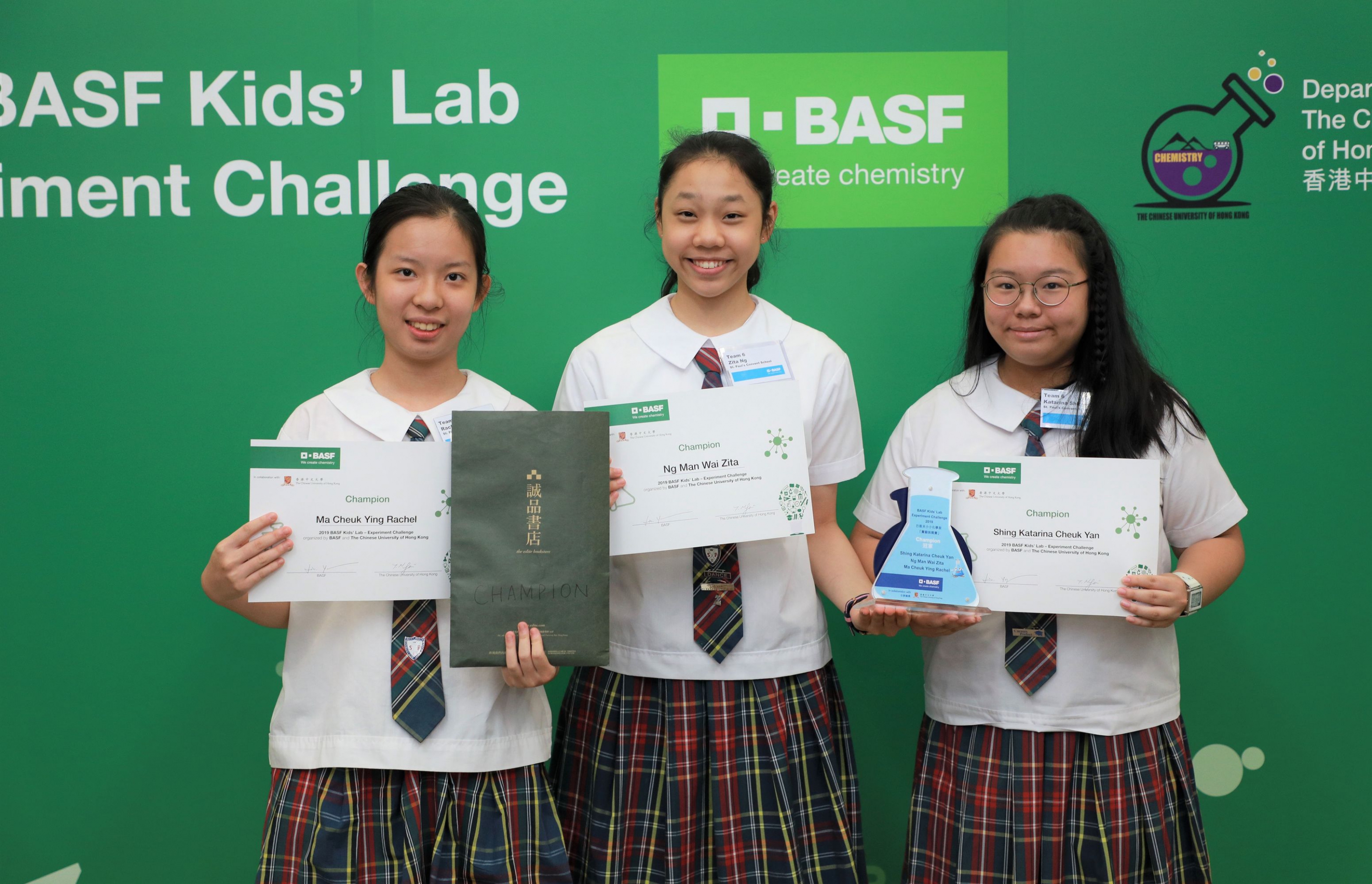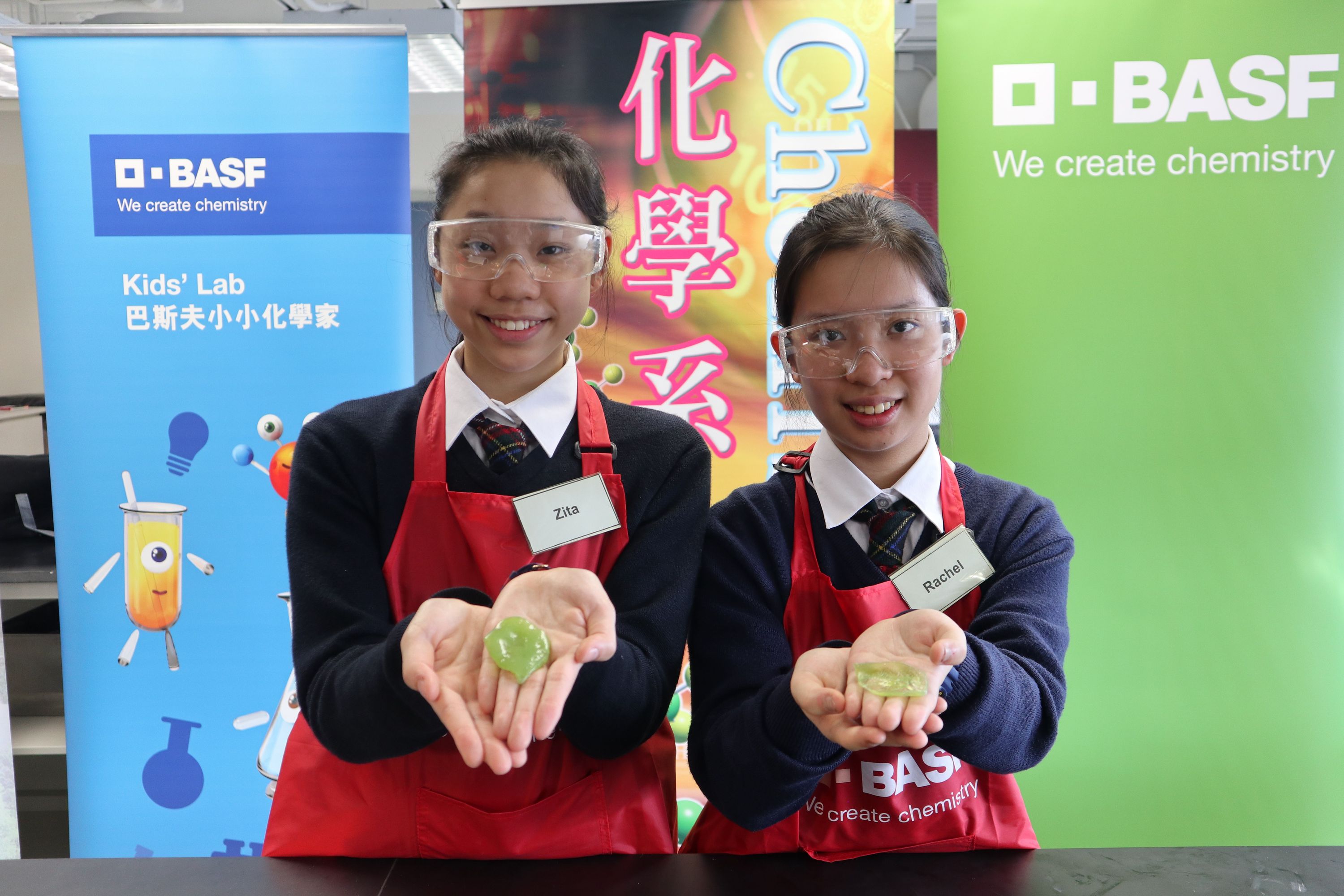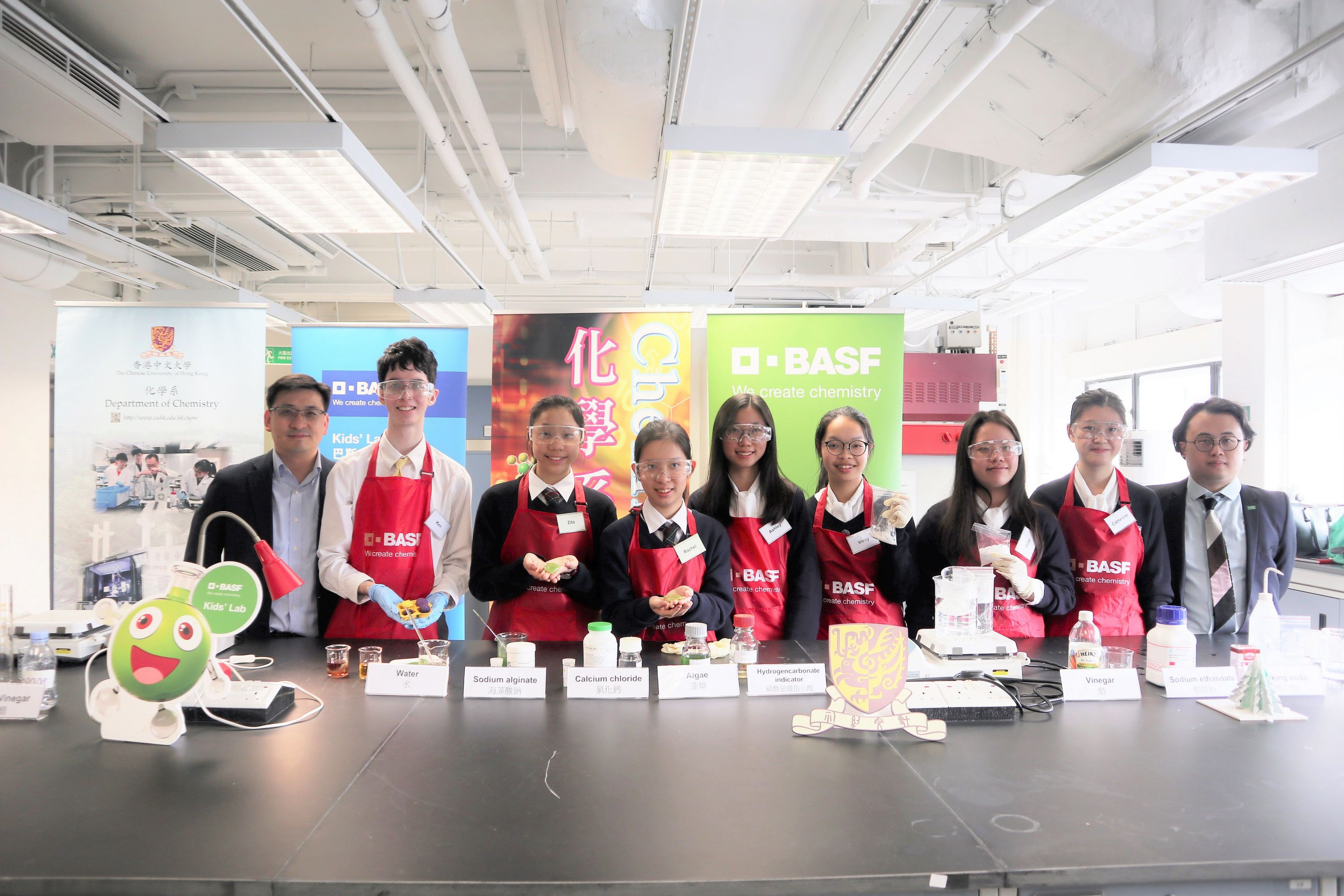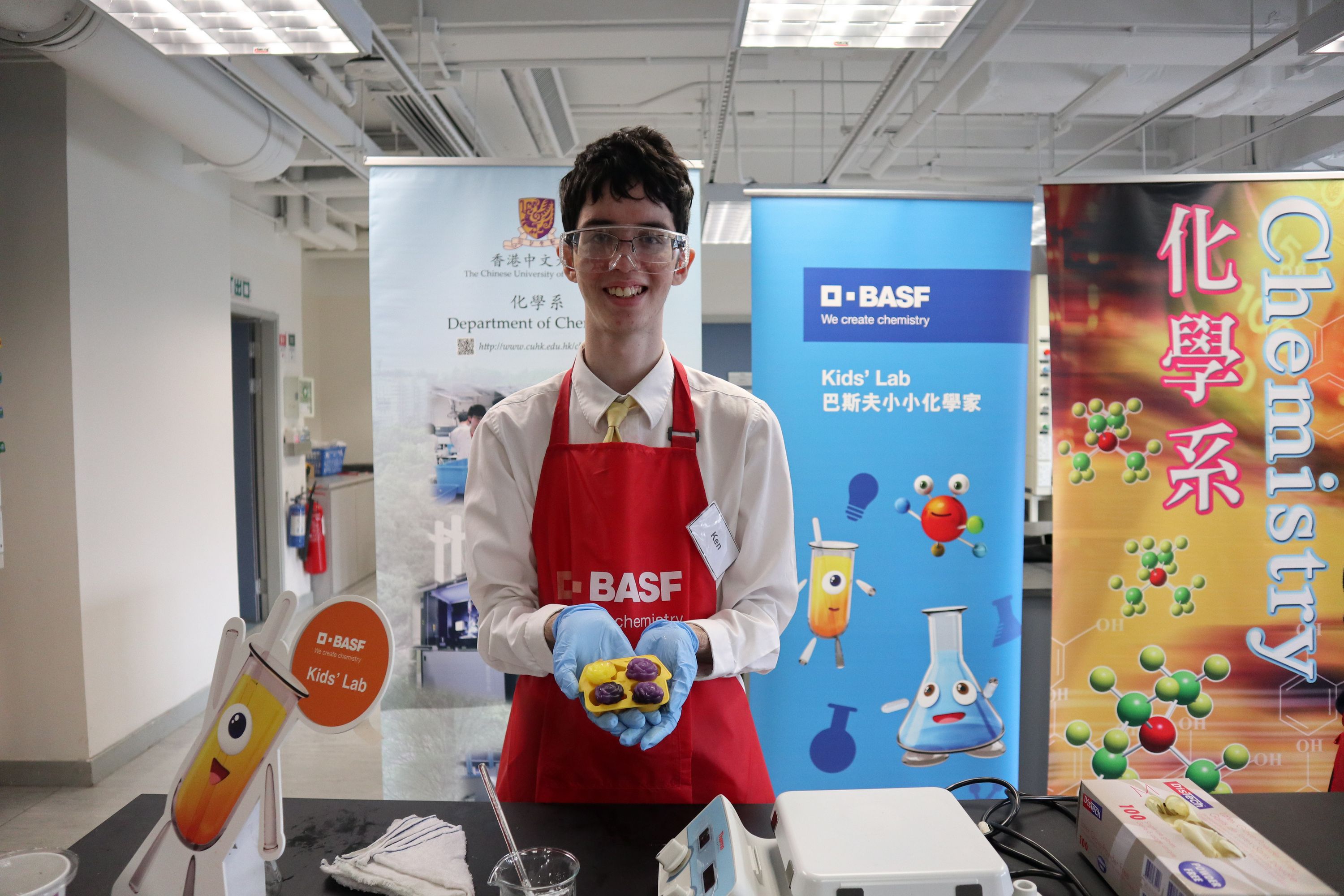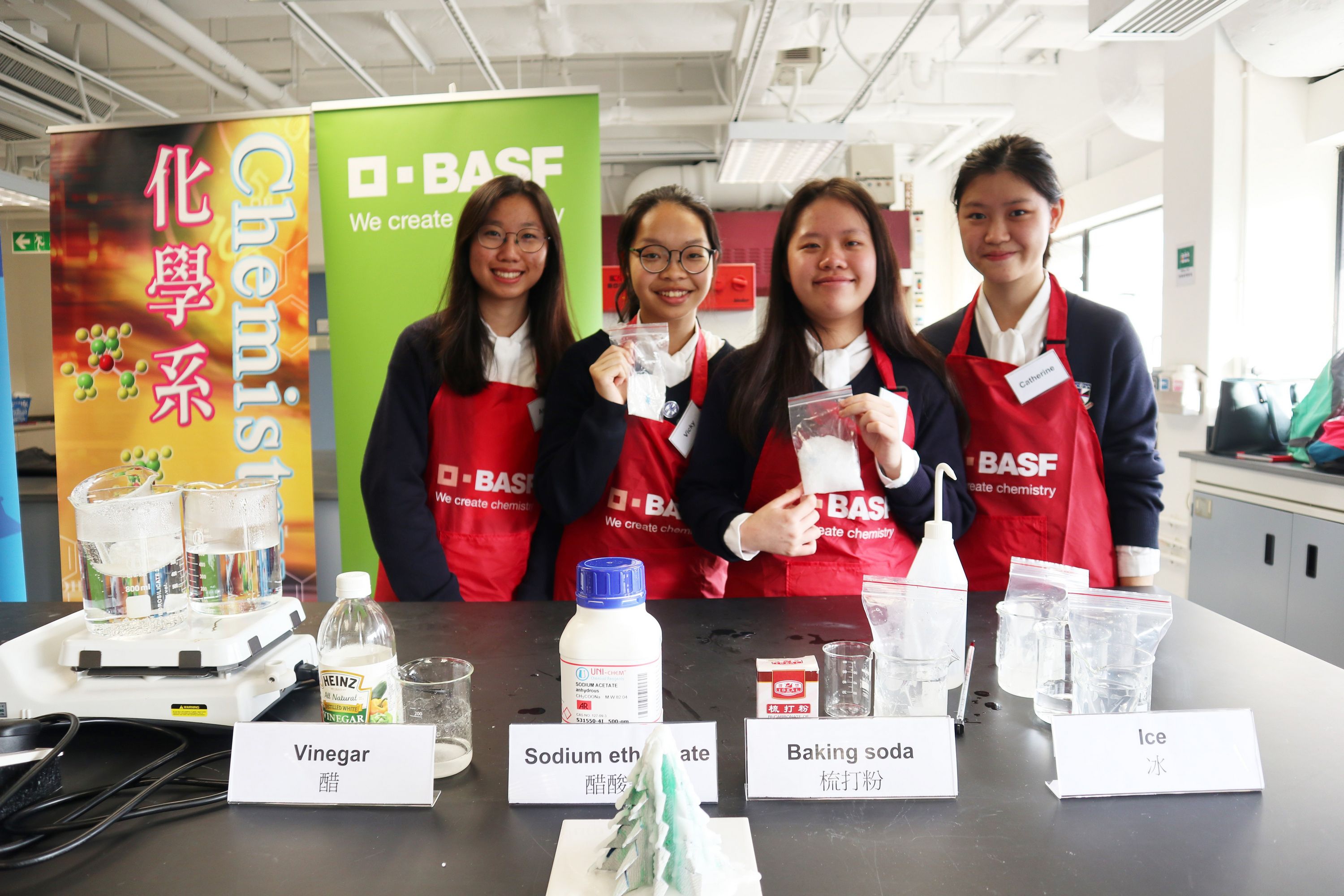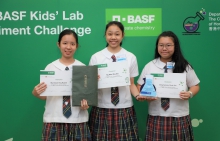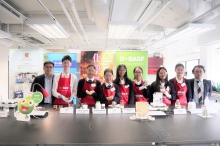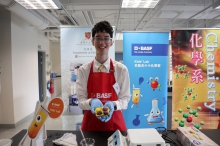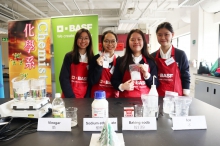CUHK
News Centre
Student scientists investigate a more sustainable lifestyle through experimental design
Climate change is one of today’s most urgent challenges, and many of the issues are closely related to individual lifestyle. Three Hong Kong secondary students have attempted to help mitigate the impacts of climate change by creating a safe and interesting experiment, “Artificial Leaf”, to simulate photosynthesis of green leaves. Rachel Ma, Zita Ng, and Katarina Shing, students from St. Paul’s Convent School won the BASF Kids’ Lab Experiment Challenge 2019, a program co-organized by BASF, the world’s leading chemical company, and The Chinese University of Hong Kong (CUHK).
The theme of the competition was to create experiments that help reduce the environmental burden through a more sustainable lifestyle. The inspiration of the winning experiment came from problems caused by harmful algal blooms, also known as red tide and green tide. The students came up with the idea of using algae to produce an “artificial leaf” that helps absorb and store carbon dioxide emissions from the atmosphere. To prolong its lifespan, they used sodium alginate to trap the algae inside the artificial leaf. The winning team was able to demonstrate their critical thinking with clear elaborations and delivered excellent performance in the question and answer session, impressing the judges with their scientific investigation skills.
To promote STEM (science, technology, engineering and math) education, the competition invites secondary school students to design an experiment for BASF’s Kids’ Lab, an interactive science workshop for primary school children. The winning experiment will be used throughout Asia Pacific at BASF Kids’ Lab. The top six teams were selected to present their ideas to the panel of judges from BASF and CUHK on November 2, 2019. The teams were assessed based on their entries’ creativity, learning, safety and the feasibility of implementing the experiment in Kids’ Lab, as well as teamwork and presentation skills.
“The experiment challenge provides the opportunity for raising student’s attention in the topic of sustainable growth of human world in the future. Through this activity, we aim to promote interest in STEM and to show how science can contribute to reducing carbon emissions and protecting the environment,” said Prof. To Ngai, Professor of the Department of Chemistry, CUHK.
“The world population keeps growing, while the planet’s resources are finite. We hope, through experimental design, students can help make a change in various aspects of daily life. Through this experiment kids can understand the importance of environmental protection from an early age, building a better and more sustainable society,” said Jeremy Tam, Manager Corporate Communications Asia Pacific, BASF.
The first runners-up were Ken Hilton and Austin Tan from HKUGA College. With the aim of reducing plastic consumptions in the world, their experiment, “Plastato”, demonstrated how they make bio-degradable “plastic” from potatoes and vinegar to replace disposable plastic items, such as utensils. The second runners-up were Vicky Hui, Ashley Hui, Catherine Lam, and Hebe Yik from Maryknoll Convent School. Their experiment used vinegar and baking soda to create an eco-friendly and reusable hand warmer. It can be made in a perfectly safe temperature and replace single-use heat pad.
BASF Kids’ Lab is a free and interactive chemistry education program designed for kids aged 6 to 12, to discover the world of chemistry through hands-on experiments. Since its launch in 1997, the program has been brought to more than 30 countries and regions around the globe. In Asia Pacific, more than 300,000 kids have participated since 2002. The program was first introduced in Hong Kong in 2005.
About BASF
At BASF, we create chemistry for a sustainable future. We combine economic success with environmental protection and social responsibility. The approximately 122,000 employees in the BASF Group work on contributing to the success of our customers in nearly all sectors and almost every country in the world. Our portfolio is organized into six segments: Chemicals, Materials, Industrial Solutions, Surface Technologies, Nutrition & Care and Agricultural Solutions. BASF generated sales of around €63 billion in 2018. BASF shares are traded on the stock exchange in Frankfurt (BAS) and as American Depositary Receipts (BASFY) in the U.S. Further information at www.basf.com.
About The Chinese University of Hong Kong
Founded in 1963, CUHK is a leading comprehensive research university with a global reputation. Located in the heart of Asia, CUHK has a vision and a mission to combine tradition with modernity, and to bring together China and the West. Under the University’s unique collegiate system, the programmes and activities offered by its nine colleges complement the formal curricula by delivering whole-person education and pastoral care. The University has eight faculties: Arts, Business Administration, Education, Engineering, Law, Medicine, Science, and Social Science. Together with the Graduate School, the University offers over 300 undergraduate and postgraduate programmes. All faculties are actively engaged in research in a wide range of disciplines, with an array of research institutes and research centres specialising in interdisciplinary research of the highest quality.
Rachel Ma, Zita Ng, and Katarina Shing (left to right), students from St. Paul’s Convent School won the BASF Kids’ Lab Experiment Challenge 2019 with their safe and interesting experiment, “Artificial Leaf”.
The champion team came up with the idea of using algae to produce an “artificial leaf” which can simulate photosynthesis of green leaves, helping mitigate the impacts of climate change.
A group photo of the three winning teams along with Prof To Ngai (left), Department of Chemistry, CUHK and Jeremy Tam (right), Manager, Corporate Communications Asia Pacific, BASF.
With their experiment “Plastato”, the first runners-up Ken Hilton and Austin Tan from HKUGA College demonstrated how they make bio-degradable “plastic” from potatoes and vinegar to replace disposable plastic items, such as utensils.


